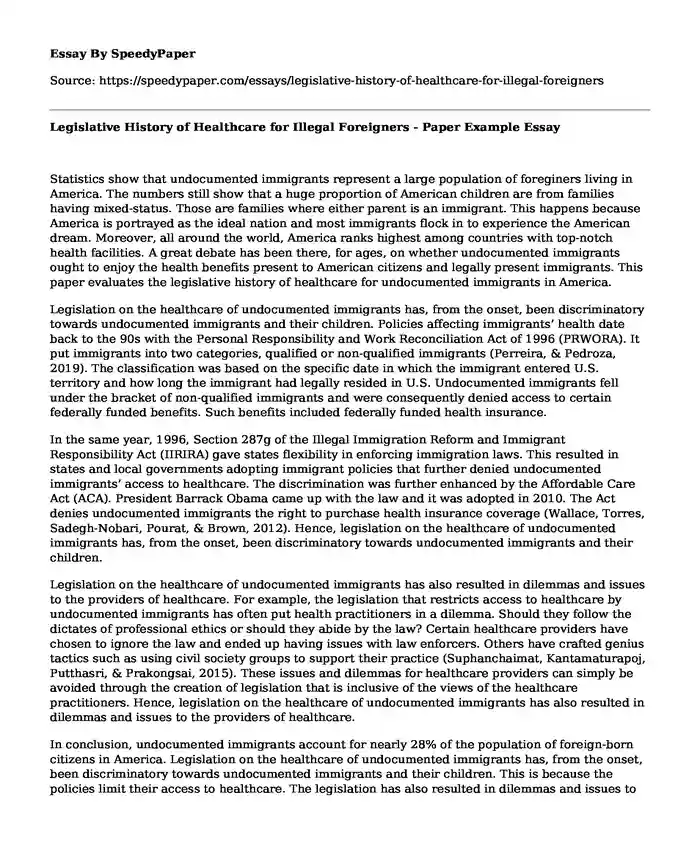
| Type of paper: | Essay |
| Categories: | Law Healthcare |
| Pages: | 3 |
| Wordcount: | 651 words |
Statistics show that undocumented immigrants represent a large population of foreginers living in America. The numbers still show that a huge proportion of American children are from families having mixed-status. Those are families where either parent is an immigrant. This happens because America is portrayed as the ideal nation and most immigrants flock in to experience the American dream. Moreover, all around the world, America ranks highest among countries with top-notch health facilities. A great debate has been there, for ages, on whether undocumented immigrants ought to enjoy the health benefits present to American citizens and legally present immigrants. This paper evaluates the legislative history of healthcare for undocumented immigrants in America.
Legislation on the healthcare of undocumented immigrants has, from the onset, been discriminatory towards undocumented immigrants and their children. Policies affecting immigrants’ health date back to the 90s with the Personal Responsibility and Work Reconciliation Act of 1996 (PRWORA). It put immigrants into two categories, qualified or non-qualified immigrants (Perreira, & Pedroza, 2019). The classification was based on the specific date in which the immigrant entered U.S. territory and how long the immigrant had legally resided in U.S. Undocumented immigrants fell under the bracket of non-qualified immigrants and were consequently denied access to certain federally funded benefits. Such benefits included federally funded health insurance.
In the same year, 1996, Section 287g of the Illegal Immigration Reform and Immigrant Responsibility Act (IIRIRA) gave states flexibility in enforcing immigration laws. This resulted in states and local governments adopting immigrant policies that further denied undocumented immigrants’ access to healthcare. The discrimination was further enhanced by the Affordable Care Act (ACA). President Barrack Obama came up with the law and it was adopted in 2010. The Act denies undocumented immigrants the right to purchase health insurance coverage (Wallace, Torres, Sadegh-Nobari, Pourat, & Brown, 2012). Hence, legislation on the healthcare of undocumented immigrants has, from the onset, been discriminatory towards undocumented immigrants and their children.
Legislation on the healthcare of undocumented immigrants has also resulted in dilemmas and issues to the providers of healthcare. For example, the legislation that restricts access to healthcare by undocumented immigrants has often put health practitioners in a dilemma. Should they follow the dictates of professional ethics or should they abide by the law? Certain healthcare providers have chosen to ignore the law and ended up having issues with law enforcers. Others have crafted genius tactics such as using civil society groups to support their practice (Suphanchaimat, Kantamaturapoj, Putthasri, & Prakongsai, 2015). These issues and dilemmas for healthcare providers can simply be avoided through the creation of legislation that is inclusive of the views of the healthcare practitioners. Hence, legislation on the healthcare of undocumented immigrants has also resulted in dilemmas and issues to the providers of healthcare.
In conclusion, undocumented immigrants account for nearly 28% of the population of foreign-born citizens in America. Legislation on the healthcare of undocumented immigrants has, from the onset, been discriminatory towards undocumented immigrants and their children. This is because the policies limit their access to healthcare. The legislation has also resulted in dilemmas and issues to the providers of healthcare as it results in a confrontation between their professional ethics and the law.
References
Perreira, K. M., & Pedroza, J. M. (2019). Policies of exclusion: implications for the health of immigrants and their children. Annual review of public health, 40, 147-166. Retrieved September 26, 2020, from https://www.ncbi.nlm.nih.gov/pmc/articles/PMC6494096/
Suphanchaimat, R., Kantamaturapoj, K., Putthasri, W., & Prakongsai, P. (2015). Challenges in the provision of healthcare services for migrants: a systematic review through providers’ lens. BMC health services research, 15(1), 390. Retrieved September 26, 2020, from https://bmchealthservres.biomedcentral.com/articles/10.1186/s12913-015-1065-z
Wallace, S. P., Torres, J., Sadegh-Nobari, T., Pourat, N., & Brown, E. R. (2012). Undocumented immigrants and health care reform. UCLA Center for Health Policy Research, 1-48. Retrieved September 26, 2020, from https://healthpolicy.ucla.edu/publications/Documents/PDF/undocumentedreport-aug2013.pdf
Cite this page
Legislative History of Healthcare for Illegal Foreigners - Paper Example. (2023, Dec 28). Retrieved from https://speedypaper.net/essays/legislative-history-of-healthcare-for-illegal-foreigners
Request Removal
If you are the original author of this essay and no longer wish to have it published on the SpeedyPaper website, please click below to request its removal:
- Research Paper Example on Therapeutic Education Program
- Free Essay Sample on Physical Therapist Requirements
- Essay Example Comprising the Interview with a Terminally-Ill Patient
- Essay Sample on Patient Healthcare Literacy
- Essay Sample on The Utilization and Hazards of Cytotoxic Drugs
- Paper Example. Newspaper Article Synopsis
- Essay Sample on Why Mathematics Appeals to My Composed and Explicit Personality
Popular categories




